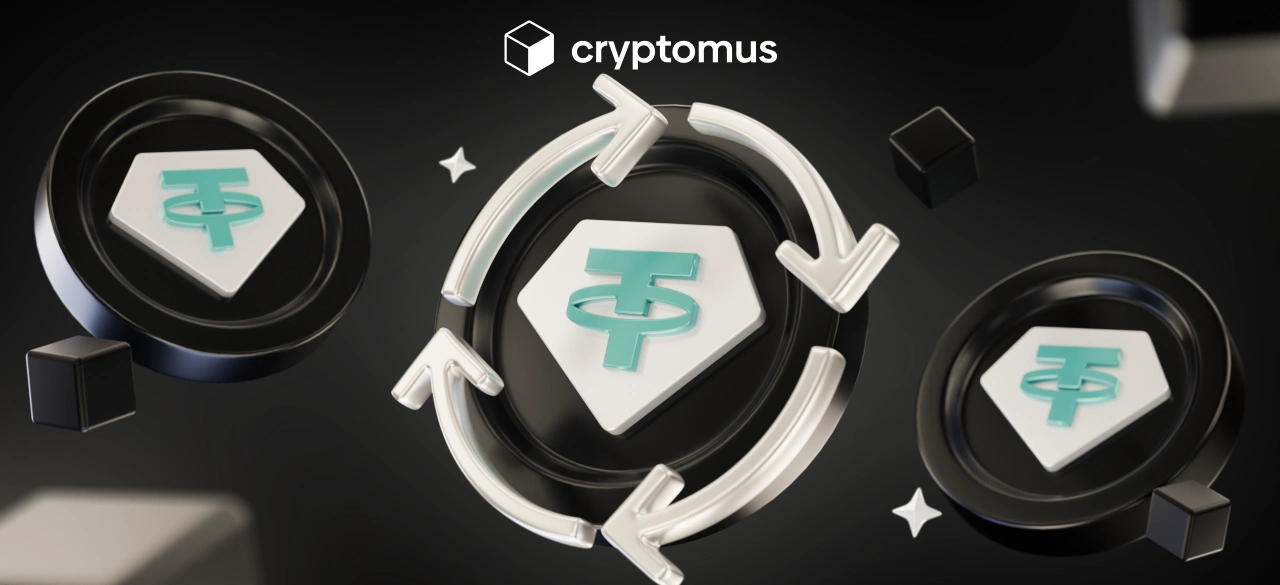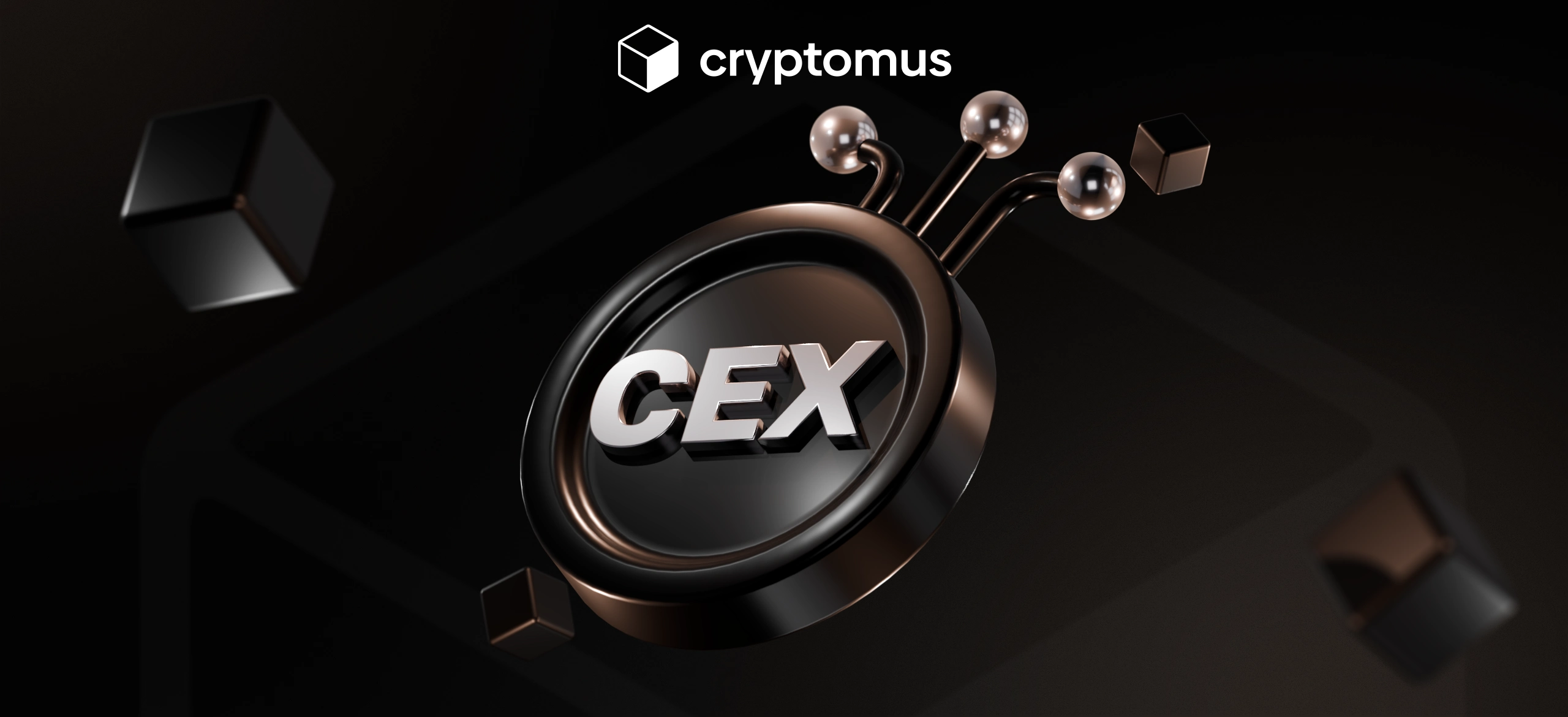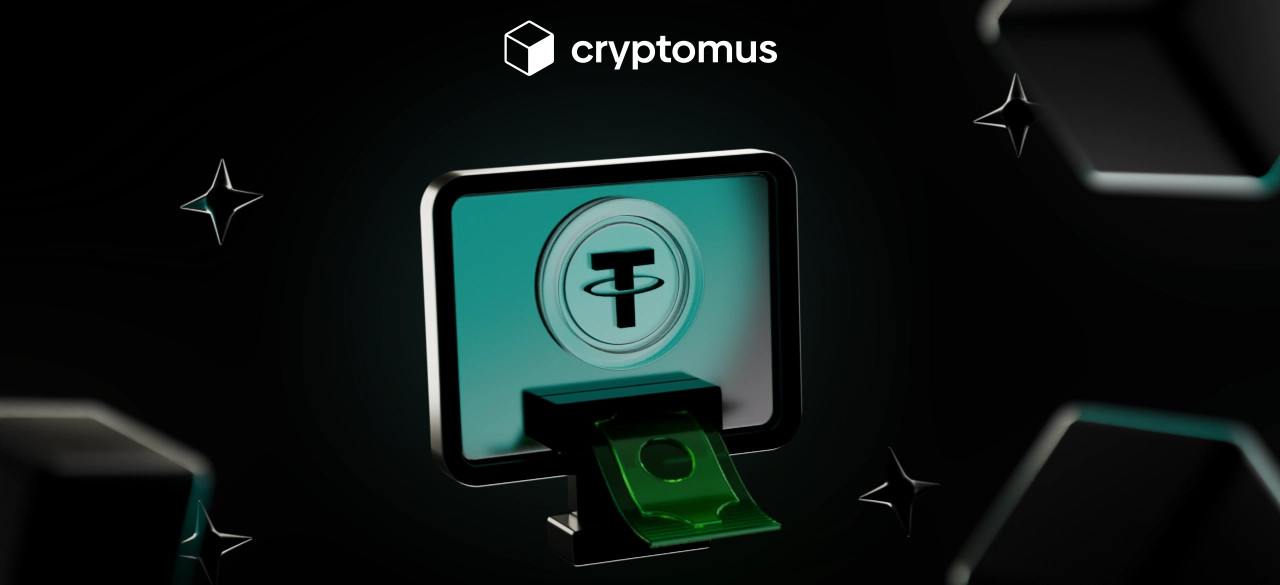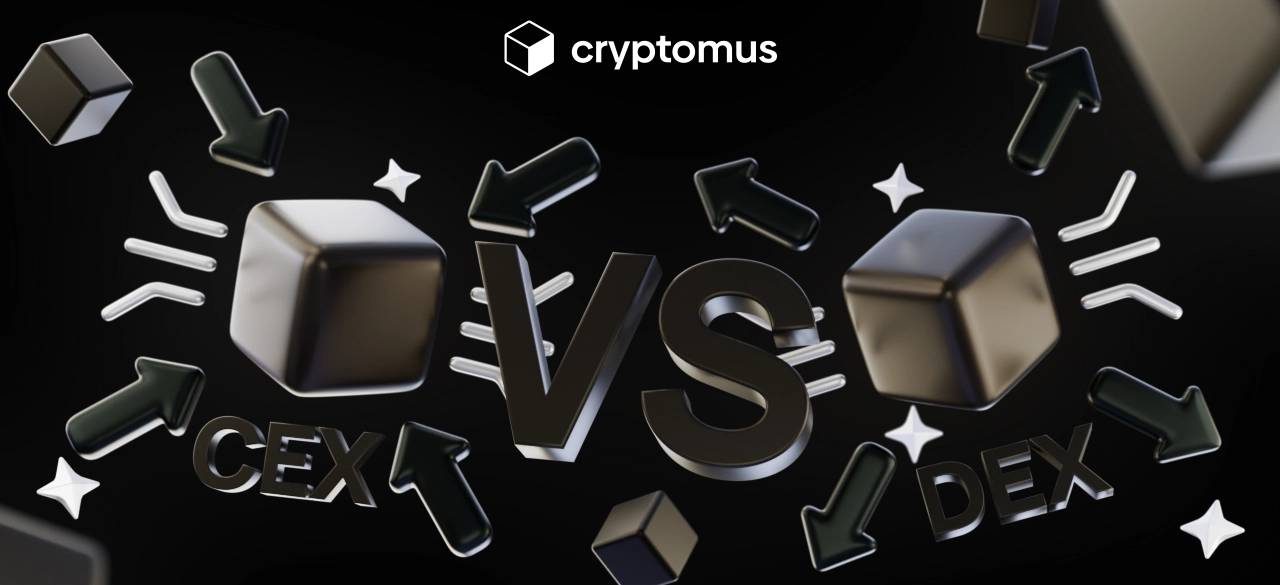
Centralized Exchange (CEX) vs Decentralized Exchange (DEX): Complete Comparison
Table of Contents
In crypto, transactions take place on exchanges and there’s a clear distinction between two main types: CEXs and DEXs.
But choosing the right exchange can be tricky. This guide will explain the basic functionalities of centralized and decentralized types and help you pick the appropriate option for your crypto objectives.
What Is Centralized Exchange (CEX)?
A centralized exchange is a trading platform acting as an intermediary between buyers and sellers in the crypto market. It matches orders, manages user accounts, and maintains control over private keys.
Users of centralized exchanges rely on the platform’s internal security protocols to protect their assets. While most reputable exchanges implement strong protective measures — including cold storage, multi-factor authentication, and withdrawal whitelists — they are also frequent targets of large-scale hacking attacks.
At the same time, CEX platforms offer several advantages over decentralized alternatives. They usually provide greater liquidity, making it easier to execute large trades without slippage. In addition to standard spot trading, many centralized exchanges also support staking, margin trading, and fiat on- and off-ramps.
However, using a CEX typically requires identity verification (KYC) which may confuse newcomers who find it suspicious to provide personal information in a space that values privacy. But don’t worry, this process helps ensure user security and also makes the platform compliant with anti-money laundering (AML) regulations. Because of this, funds coming from centralized exchanges are often considered more “clean” and trustworthy in the eyes of regulators, financial institutions, and other service providers — compared to funds moved through anonymous decentralized platforms.
How CEX Works?
When you utilize a CEX, you deposit your tokens into the exchange's wallet. The CEX then retains these funds until you decide to buy or sell. All orders are made through an order book system which matches buyers with sellers depending on price and quantity.
Here’s how a centralized exchange works:
-
User creates an account;
-
User deposits funds;
-
User places a crypto order;
-
CEX matches the order;
-
The trade gets executed;
-
User withdraws crypto to a personal wallet.
Pros And Cons Of CEX
To determine if a centralized exchange is right for you, consider the following advantages and disadvantages:
The pros of CEXs include:
-
User-friendly: CEXs tend to have simple interfaces, and the ability to buy crypto with fiat, which makes them accessible for beginners.
-
Liquidity: such platforms often cover a wide variety of crypto, making it simpler to acquire and sell tokens quickly.
-
Regulation: centralized exchanges have regulations designed to prevent fraud and illegal activity.
-
Margin trading: some CEXs support margin trading, which allows users to borrow cash from the exchange to increase their profits
The cons of CEXs are:
-
Counterparty risk: you trust the CEX with your crypto assets and have no direct control over your private keys. So, if it is hacked, you risk losing your funds.
-
Limited coin selection: not all cryptos are listed on every CEX. So make sure the one you've picked supports all of the tokens you want to trade with.
-
Fees: CEXs impose various fees, from trading to withdrawals, which may reduce the profits over time.
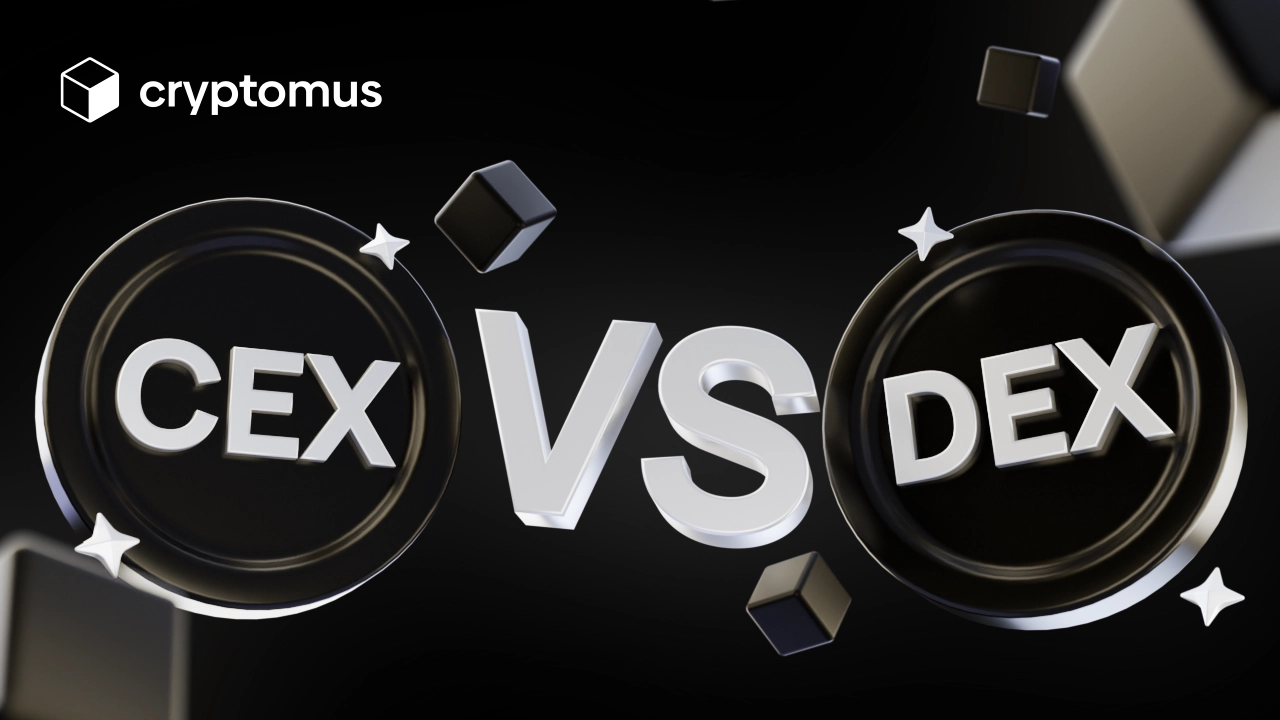
What Is Decentralized Exchange (DEX)?
A decentralized exchange is a peer-to-peer marketplace where you may trade cryptocurrencies directly with other users, bypassing the middlemen.
DEX might be viewed as a more independent option compared to CEXs. Unlike CEXs, they do not store user funds or private keys, giving users full control over their assets. Because there is no central authority overseeing transactions, KYC verification is not required, and users can trade anonymously.
However, this also means DEXs are not AML-compliant, which can pose challenges when interacting with more regulated institutions or when attempting to convert crypto into fiat. While they offer enhanced privacy and freedom, this lack of compliance can be a double-edged sword, especially for those who need to prove the legitimacy of their funds.
How DEX Works?
DEXs are peer-to-peer platforms where users directly connect to trade crypto. These exchanges run without a central authority and rely on smart contracts for trading.
A decentralized exchange works like this:
-
User connects a crypto wallet with a DEX;
-
User places an order;
-
The order gets automatically matched with another one;
-
Smart contract executed the trade.
One key advantage of DEXs is that trading occurs directly from the user's personal wallet, meaning there’s no need to transfer funds to the exchange. Unlike centralized exchanges, where you must deposit your crypto before trading, on a DEX, you always retain control over your funds. This adds an extra layer of security since your assets are never held by a third party.
Pros And Cons Of DEX
As you could expect, DEXs also come with their pros and cons. The pros consist of:
-
Security: DEXs eliminate the risk of exchange hacks since you retain custody of your private keys.
-
Transparency: all the transactions on decentralized exchanges are public and verifiable on the blockchain.
-
Coin selection: such platforms often list a wider scope of crypto, including new tokens that might not be available on CEXs.
-
No permissions: decentralized exchanges are open to anyone with a crypto wallet, you don’t need to register or verify your ID to use it.
As for the cons, DEXs are known for:
-
Complexity: they can be more difficult to use for beginners as there are no intermediates and users must keep their own private keys.
-
Low liquidity: you might experience slower trade execution, particularly with less popular tokens.
-
Limited functionality: DEXs offer fewer features compared to CEXs, there’s no margin trading or the ability to buy tokens with fiat.
Head-To-Head Comparison Of CEX And DEX
Although centralized and decentralized exchanges allow crypto trading, they are complete opposites in terms of operation. CEXs are controlled by a single entity, and DEXs are permissionless and use smart contracts for user-to-user trades. CEXs provide more liquidity while retaining control over your funds, whilst DEXs provide more control but are less user-friendly and have lower trading volume.
There are loads of CEXs and DEXs out there. Popular CEX examples are Cryptomus, Binance and Coinbase. DEX examples include Uniswap, PancakeSwap and Curve.
Here's a more detailed comparison of CEXs and DEXs:
| Feature | Centralized Exchange (CEX) | Decentralized Exchange (DEX) | |
|---|---|---|---|
| Control | Centralized Exchange (CEX)Custodial: exchange holds your funds | Decentralized Exchange (DEX)You have control of your private keys | |
| Security | Centralized Exchange (CEX)Relies on CEX's security measures | Decentralized Exchange (DEX)Potentially more secure due to blockchain and self-custody | |
| User Interface | Centralized Exchange (CEX)Simple, intuitive interfaces | Decentralized Exchange (DEX)Less user-friendly, can be complex for beginners | |
| Fiat Support | Centralized Exchange (CEX)Usually supports fiat deposits and withdrawals | Decentralized Exchange (DEX)Limited or no fiat support | |
| Liquidity | Centralized Exchange (CEX)Generally higher liquidity | Decentralized Exchange (DEX)Lower liquidity, potentially slower trades | |
| Trading Fees | Centralized Exchange (CEX)Higher fees | Decentralized Exchange (DEX)Lower fees | |
| Regulation | Centralized Exchange (CEX)Subject to regulations and KYC requirements | Decentralized Exchange (DEX)Less regulated |
Your priorities determine whether to use a CEX or a DEX. If you're a beginner and require fiat support use a centralized exchange. If you want to maintain control over your funds and don't mind slower transactions, a decentralized exchange is for you.
As we just discovered, both CEXs and DEXs have positive and negative aspects. Make sure to consider factors like ease of use, security, and liquidity before deciding which platform type is the best fit.
We hope this guide has helped you make a decision. Send in your thoughts and questions below!
Simplify Your Crypto Journey
Want to store, send, accept, stake, or trade cryptocurrencies? With Cryptomus it's all possible — sign up and manage your cryptocurrency funds with our handy tools.
Get Started







